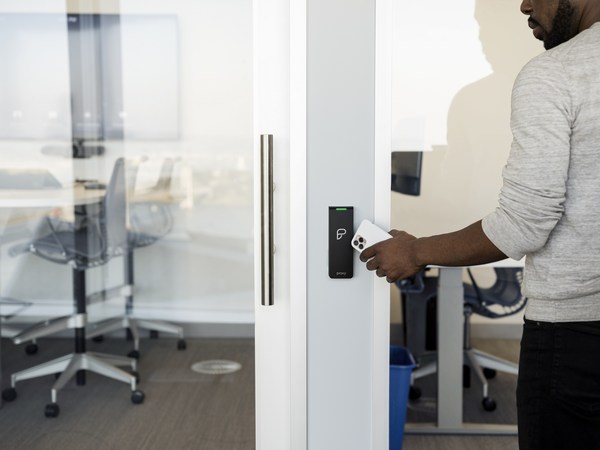HONG KONG, Dec. 16, 2020 /PRNewswire/ — Although the COVID-19 pandemic has caused widespread disruption to daily life, once it subsides a new normal will emerge, allowing smart workplaces to enter a new stage of development. Such workplaces will need to allow employees to move around the office environment safely, hygienically and seamlessly. Following the pandemic, employees will increasingly utilize contactless technology—entrance doors will be opened via a user’s mobile device rather than keycards; tablets installed with visitor management application software will seamlessly register body temperature readings for each person entering the workplace; meeting rooms will be equipped with endpoint sensors using Bluetooth technology to detect employees or visitors entering the workspace and greet them with a personalized message. Sensors will monitor room capacity to allow enforcement of social distancing requirements; and intelligent sensing devices will automatically adjust ambient temperature, lighting, and other conditions based on the detected density and distribution of people, with all data transmitted to a cloud-based management platform.
This is how Proxy, the smart workplace pioneer that entered the Chinese market in 2019, envisions the future of the workplace. These smart workplace applications for the post-pandemic era will not only enhance employee experience, but also drive changes in the workplace via innovative contactless technology.
Leading innovation in smart access
While the world is constantly evolving with the emergence of new technologies, most people continue to access their workplace via decades-old keycard technology that is neither secure nor easy to manage. “We’re creating a unique identity signal for everyone on the earth that’s universally accessible, secure, and private”, remarked Denis Mars, co-founder and CEO of Proxy. “We want to live in a world where every object around us can securely recognize our physical presence with our permission to provide us with a frictionless experience, personalized to our individual needs and preferences”.
Unlike traditional access systems, Proxy’s mobile access solutions utilize Bluetooth technology that’s built in to every smartphone, with access granted and managed via the cloud. This method makes access easier, as well as more efficient, secure and reliable. In addition to smart mobile access products, Proxy also provides solutions for smart visitor and space management, based on contactless technology.
Following the launch of these products by Proxy, many companies including Uber, Accenture, Harmay, Shui On Land and WeWork have adopted them in the workplace. These successes have been recognized by Fast Company which has named Proxy as one of the Most Innovative Companies in the World in 2020. Forbes magazine also added Proxy to its list of the Next Billion-Dollar Startups.
As we enter a new normal, Proxy stands to gain immeasurable advantages, with its contactless smart access solutions potentially eliminating the spread of viruses and bacteria that originate from the touching of access points. This will provide all employees with a better office experience. Sean Pan, head of Proxy China, said, “The pandemic has prompted employers to seek more innovative security requirements in the workspace. At Proxy we hope to lead technology innovations with contactless, smart mobile access products and solutions that empower businesses to enhance their office experiences in the post-pandemic era. By so doing, we not only create business value, but also drive people to focus on smart workplaces”.
Proxy creates future-proof office experiences that are universally accessible, secure, and private
Combining global standards and local support, Proxy provides solutions that are customized to address customers’ different needs in various scenarios, providing purpose-designed solutions for multinational companies, as well as organizations with multiple office sites. Proxy has passed a number of globally recognized data security and privacy certifications, including the EU General Data Protection Regulation (GDPR) and SOC 2 security audit. Proxy’s cloud service is currently deployed across the world, with servers based in numerous regions to guarantee the security and access of customer data.
Importantly, Proxy also realizes the value of localization and, as a security technology company, attaches great importance to customer experience and feedback. Responding to the needs of the local market, Proxy has developed a dedicated local product service team, and also launched a domestically hosted cloud platform, as well as local support for the Android system and WeChat mini-programs. All of these capabilities have been developed to ensure the requirements of local customers are fully satisfied when utilizing Proxy solutions.
One notable deployment of Proxy’s smart access solution is in the offices of Canva, the world’s largest online design platform, located in the Beijing Vanke Times Center. “Proxy offers a unique, light mobile access solution that fits our needs perfectly. With this cloud-based solution in place, our staff can now use their mobile devices to provide streamlined, secure access to the building and their offices. Not only is this a convenient, contactless solution, but it also aligns with our company culture and flexible working hours,” said Chris Wang, senior internal architecture engineer at Canva.
Proxy is dedicated to empowering people with a digital identity for the physical world, redefining the way people visit and interact with their workspace. As health and safety are paramount concerns for today’s businesses and employees, Proxy’s contactless mobile access applications improve the hygiene of workplaces while providing a foundation for future smart workplace initiatives. Proxy’s mobile technology and cloud-based management platform not only empower businesses to transform but also prepare them to respond to challenges in the post-pandemic era.
About Proxy:
Proxy was founded in 2016, San Francisco and entered China in 2020. Proxy is dedicated to empowering people with a personal identity signal for universal access. The signal, emitted from a smartphone, can give people frictionless access to any space or device. Large global enterprises and CRE companies like WeWork, Accenture and BXP (Boston Properties) enable their employees, visitors and tenants to use their Proxy signals for frictionless smartphone-based access.
For more information, please visit www.proxy.com.


